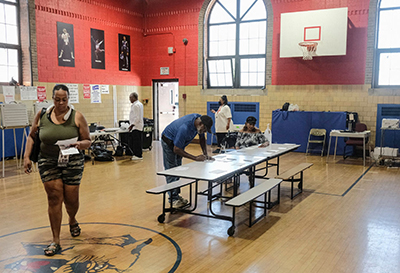Only time will tell if amendments like these will lead to actual change, but we can all agree that ending slavery real or symbolic is a good thing.
Written By Bilal G. Morris , Senior Editor
(Source NewsOne):
Voters in five states will see slavery on their ballot this November as prison reform advocates push to abolish slavery and involuntary servitude as well as reshape the prison labor system.
Not sure if you knew this but, slavery technically still exists.
In 1865, the 13th Amendment to the U.S. Constitution was ratified, abolishing slavery and involuntary servitude in the United States, except as a punishment for crime. The exception loophole was adopted by 20 state constitutions.
Voters in Alabama, Louisiana, Oregon, Tennessee, and Vermont will head to the polls this midterm election to vote on amendments prohibiting slavery and involuntary servitude, which could transform prison labor and the criminal justice system. Colorado, Nebraska, and Utah have already approved similar ballot initiatives.
“This is the crown jewel of criminal justice reform,” said Curtis Ray Davis II in an interview with PEW. “Most people believed it was impossible to get the amendment on the ballot in Louisiana, but Louisiana and America should not be in the business of legalized slavery”
Some advocates want to remove the exception clause from the U.S. Constitution altogether and believe once voters abolish the exceptions on a state level, Congress will follow suit.
“We want to remove offensive language and provide protection for citizens from slavery and involuntary servitude,” Max Parthas, co-director of state operations of the Abolish Slavery National Network told PEW.
Some state representatives say the amendment is mostly symbolic and believe the language could be more harmful than it was originally written.
Louisiana state Rep. Alan Seabaugh, a Republican who opposed the measure, told PEW the effect would be “absolutely none, whatsoever. It’s essentially just symbolic. It says what’s already on the books — although potentially worse. The new amendment technically allows slavery,” Seabaugh said. “I don’t think anybody thought of it that way, but that’s what it says.”
Although getting these amendments on ballots is a good thing, provisions for forced labor within the criminal justice system are still finding their way into the language.
After Colorado passed its amendment in 2018, a lawsuit seeking higher wages for prison workers was dismissed. Since then other states have added language to their amendments that suggest prison work is still authorized.
Tennessee’s amendment was changed at the request of the Department of Corrections to read, “Slavery and involuntary servitude are forever prohibited. Nothing in this section shall prohibit an inmate from working when the inmate has been duly convicted of a crime.”
“The Department of Corrections asked us to put in the exception,” said Tennessee state Sen. Raumesh Akbari in an interview with PEW. “I don’t think it would have moved forward if we had not agreed to do it.”
No one really knows how these amendments will affect the prison labor system, but it is important to understand what you are voting for. Only time will tell if amendments like these will lead to actual change, but we can all agree that ending slavery real or symbolic is a good thing whether the person is in prison or not.

